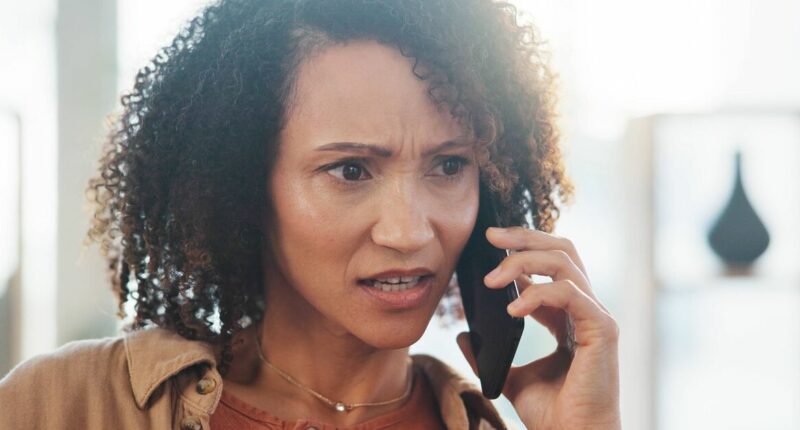Share this @internewscast.com

What are my legal rights to an in-person GP appointment? (Image: Getty )
A specialist in medical negligence has answered common questions from UK citizens about GP consultations, addressing patients’ specific rights. This advice comes after the NHS England’s GP Patient Survey, which highlighted the difficulties patients face in securing in-person appointments with their doctors.
Results showed that over one-third of respondents (34.7%) experienced significant or extreme trouble contacting their GP practice by phone. Additionally, more than a quarter (27.7%) of patients had remote consultations instead of face-to-face visits.
Nearly 42.5% of patients seldom or never saw their preferred healthcare provider when requested, according to the Mirror. In response to these findings, Sophie McGarry, a solicitor at Patient Claim Line, has detailed patients’ legal rights to have face-to-face GP consultations.
She has also detailed the available options for people who believe they received an incorrect diagnosis during telephone or video appointments.
Are patients legally entitled to face-to-face GP appointments?
Patients must now be offered in-person consultations if this is their choice. NHS GP explains: “New NHS guidance mandates that practices in England must offer face-to-face appointments if requested. GPs who do not facilitate appointments without lengthy phone waits or who are unavailable for in-person consultations are, legally speaking, in violation of the law.”
NHS England has given guidelines to GP practices to ensure in-person appointments are available. These guidelines state that patient preferences for face-to-face care should be honored unless there are valid medical reasons not to, such as the presence of COVID symptoms.
In England, NHS regulations require that GP practices should provide face-to-face appointments when requested. However, there is no absolute legal right to an in-person visit if the GP considers a remote consultation more suitable.
Nevertheless, patients do have the right to see a healthcare professional within 48 hours if necessary. If you feel you require a face-to-face appointment, don’t hesitate to request one and explain your reasons. If your request is denied, you can escalate the matter to the practice manager or lodge a formal complaint.
NHS England says: “While the expanded use of video, online and telephone consultations can be maintained where patients find benefit from them, this should be done alongside a clear offer of appointments in person.” You can read more about the choices available to you in the NHS on its website.
Read more: ‘I had no symptoms – then one chat with GP turned my life upside down’
Read more: NHS accused of ‘fobbing off’ patients with digital GP appointments
What should you do if a face-to-face appointment isn’t offered?
In a letter to GP Practices dated 13 May 2021, NHS England advises that all practice websites should clearly provide and maintain information on:
- How to contact the GP and request assistance.
- How to access face-to-face or walk-in services.
Ms McGarry suggests that the first step could be to check your practice’s website for information on how to access face-to-face or walk-in services. If this information is not readily available on the website, you could ask the practice to provide it to you.
She also suggests that if you face any pushback from the practice, you could point them to NHS England’s letter, which asserts that this information should be accessible on its website at the very least. Request your GP Practice to organise a face-to-face appointment for an assessment, examination, or testing and clarify why you believe an in-person appointment is essential.
Make it clear that your preference is for a face-to-face appointment, and you can cite the NHS England guidance that all GP Practices must ensure they are providing face-to-face appointments, and practices should respect preferences for in-person care.
She continued: “If the GPs or receptionists continue to refuse to examine you in person, you could escalate the matter to the Practice Manager and ask them to explain why your wish and request for a face-to-face examination are being refused.” You can see what options are currently available to NHS patients in the NHS Choice Framework.

GP practices must ensure they are offering face-to-face appointments (Image: Getty)
How to arrange, modify or cancel an appointment
If you believe you require an appointment at your GP surgery, you can get in touch with them:
- using a form on your GP surgery’s website (many surgeries also have a form you can access if you use the NHS App or log into your account on the NHS website)
- by phone
- in person, by going into the surgery and talking to the receptionist
Before scheduling an appointment, your GP surgery may inquire about what you need assistance with. This will help them determine how quickly you need to be seen and assist them in selecting the most appropriate doctor, nurse or health professional to aid you.
Are face-to-face appointments ‘better’?
Ms McGarry said: “Telephone and remote assessments have their place for certain minor issues, but overall, I believe in-person appointments are safer, and you are less likely to be misdiagnosed than if you had a remote assessment.
“If a GP is assessing someone by telephone, there is no opportunity for them to conduct any tests or examinations. If a GP is assessing someone in person, even if they just want to perform the examinations as a precautionary measure, this is more likely to identify an abnormality than a telephone appointment.
“An in-person appointment also lends itself to any incidental findings which would not be spotted during a telephone assessment. During a remote assessment, a GP is completely reliant on asking the right questions and the patient providing the right answers.”
She added: “People are also discussing difficult and sensitive personal issues. It may be easier for them to open up to a GP in an in-person appointment, where they are receiving face-to-face, hands-on, human care, which is much more personable, rather than speaking to a voice asking questions on the phone.
“Remote appointments can leave patients feeling like there is a disconnect between them and their GP, and like there is less ‘care’. In stressful and emotional situations, patients will find comfort in the GP’s physical presence and human touch.
“During an in-person appointment, patients are in the room with their GP, solely focusing on the consultation and discussing their symptoms. Telephone GP appointments can catch patients whilst they are at work, driving, or doing the shopping, so the patient may not be able to give the appointment their full, undivided attention.”
Our community members are treated to special offers, promotions, and adverts from us and our partners. You can check out at any time. Read our Privacy Policy
What are the potential dangers of remote consultations?
As highlighted by NHS England, without proper training, support, and procedural development, medical staff may find it challenging to deliver optimal patient care through remote methods. Under these conditions, remote consulting could lead to:.
- postponed or overlooked diagnoses.
- excessive or insufficient patient investigation.
- heightened pressure on clinicians to make remote clinical decisions.
- deterioration in the healing relationship between patients and medical professionals.
- rise in the transactional nature of care rather than personalised treatment, where patients encounter restricted remote interactions or feel unable to see their doctor in person.
- lost chances to detect subtle indicators during face-to-face consultations.
- technological exclusion of particular patient demographics.
- growing complications for reception teams when scheduling patients for various consultation formats.
- Technology obstacles or basic barriers, such as poor mobile reception, can create difficulties for patients required to consult remotely.

Before booking an appointment, your GP surgery may ask what you need help with (Image: Getty)
Are there certain people who are more challenging to evaluate remotely?
The solicitor explained: “Generally speaking, children, the elderly and those with mental health issues or communication difficulties, can be more difficult to assess remotely. Children can have difficulties expressing themselves and their symptoms so this may require more careful assessment.
“The elderly may be hard of hearing and struggle to hear on the phone, and therefore may be less likely or able to give a full account of their symptoms. They may also be less technologically skilled and be unable to share photographs to evidence issues.
“I believe older people value the face-to-face and human touch more. GPs may be more likely to find incidental findings, conditions and symptoms in older people during an in-person appointment.
“Some people do not feel comfortable speaking on the phone and may find it difficult to express themselves or may benefit from an in-person appointment to feel able to open up about their mental health symptoms. However, it’s important to remember that every demographic is vulnerable to health issues, which can be difficult to assess remotely.”
Are you already aware?
Should a GP need to refer you for a physical or mental health condition, in most circumstances, you possess the legal right to select the hospital or service you’d prefer to attend. This will encompass numerous private hospitals provided they deliver services to the NHS and it does not cost the NHS any more than a referral to a standard NHS hospital.
You have the option to select a clinical team led by a consultant or a specific healthcare professional, provided they offer the treatment you need. Discover more about selecting a hospital or consultant and choosing a mental health service.
Your appointment can be booked through the NHS e-Referral service. This can be done at your GP surgery, or online, using the shortlist of hospitals or services provided in your appointment request letter.
Your GP selects this shortlist, so ensure you communicate your preferences during your appointment. You are legally entitled to request a change of provider if you’re likely to exceed the maximum waiting time for your treatment.
The hospital or integrated care board (ICB) will need to investigate and present you with a variety of suitable alternative hospitals or clinics that could see you sooner. For more information, refer to the guide on waiting times.
Is it harder to diagnose conditions when appointments are remote?
Ms McGarry suggests that any condition requiring visual assessment or physical touch is more challenging to assess and diagnose accurately when an appointment is conducted remotely. This could include infections, chest pain, and abdominal pain.
It’s crucial for a patient to show the GP precisely where the pain is and for the GP to palpate the area to determine exactly where the pain is.
Assessment of a lump or changes to the skin
The solicitor emphasises the importance of visualising and feeling a lump to determine its location, size, hardness or softness, and whether it causes pain upon touch. Furthermore, he advises comparing the affected side of the body with the unaffected side.
Early detection of cancers hinges on knowing your body, feeling your body, and noticing changes, rather than relying on photographs. GPs need to physically examine a lump to decide if it is suspicious and requires further investigation or referral, and to determine the urgency of that referral, be it routine or an urgent two-week suspected cancer pathway.
Regarding internal assessments, Ms McGarry stated: “An example is a digital rectal examination to assist in diagnosing prostate cancer, or vaginal examinations with a speculum to visualise cervical abnormalities, assisting in the diagnosis of cervical cancer. GPs need to see and feel the prostate or cervix to decipher whether or not there are suspicious features which require further investigation / onward referral. They need to consider on what basis the referral should be made, either routine or an urgent two week suspected cancer pathway.”
Visual or physical internal assessments
Ms McGarry said: “An example is a digital rectal examination to assist in diagnosing prostate cancer, or vaginal examinations with a speculum to visualise cervical abnormalities, assisting in the diagnosis of cervical cancer. GPs need to see and feel the prostate or cervix to decipher whether or not there are suspicious features which require further investigation / onward referral. They need to consider on what basis the referral should be made, either routine or an urgent two week suspected cancer pathway.”
But do any conditions necessitate intimate examinations?
NHS England states: “It is not advisable to encourage patients to send clinical images of intimate regions or reveal or self-examine intimate areas during a remote consultation. The GMC is clear that all patients should be offered a chaperone. Patients who require an intimate examination should, therefore, be encouraged to attend for a face-to-face assessment.”
Limb ischaemia demands evaluation of peripheral pulses to establish whether they are weakened or missing entirely. Limb ischaemia involves a diminished blood flow to the extremities, which may impact the arms or legs.
Additional conditions requiring intimate examination may involve:
- Any ailment necessitating the evaluation of temperature or blood pressure.
- Physical inspection of eyes, ears or mouth.
- Evaluation of any bodily opening or skin irregularities.

Clear advice should be provided and maintained on all practice websites (Image: Getty)
What if you suspect you’ve been incorrectly diagnosed during a phone or video consultation?
Ms McGarry explains: “If you believe that you have been misdiagnosed over the telephone or in a video consultation at the time of your assessment, you can ask your GP to arrange an in-person appointment for further assessment, examination or testing and explain why you feel a face-to-face appointment is necessary.
“If that particular GP will not arrange an in-person appointment with you, you can call the surgery to make a further appointment and request an in-person appointment for a second opinion and further assessment, examination or testing and explain why you feel a face-to-face appointment is necessary.
“For example, you could advise that you are very concerned that the lump you have located is suspicious and you feel a physical appointment is necessary so that the GP can see and feel a lump to decipher whether or not it is suspicious and requires further investigation / onward referral and on what basis that referral should be made. If the GPs continue to refuse to examine you in person, you could ask for the matter to be escalated to the Practice Manager.”
Should your condition become urgent or worsen following a telephone or video consultation, you should take appropriate action by attending a walk-in centre, urgent care centre or A&E, depending on the severity of your condition and your level of concern.










